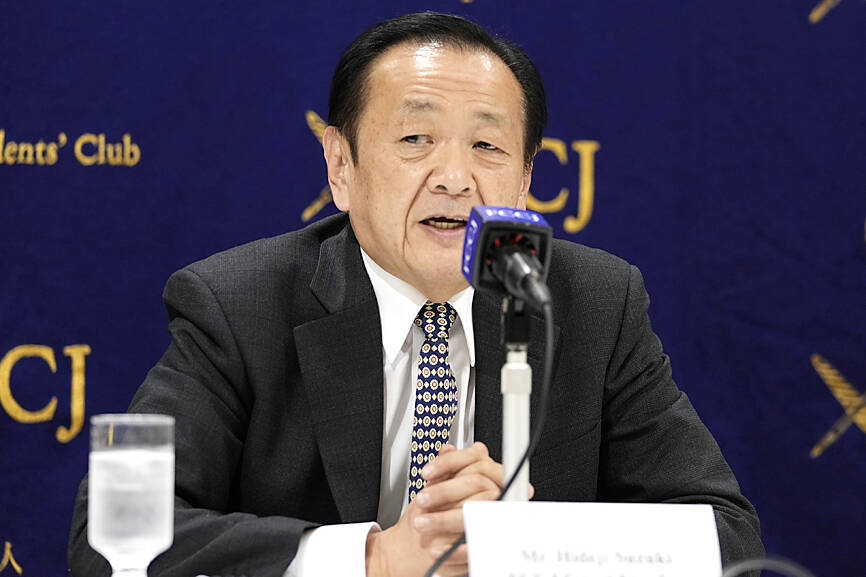The former head of a Japan-China friendship group who recently returned to Japan from six years in a Beijing prison for what he said were false spying charges said he still hopes to see China become a global leader, but with better treatment of human rights.
Hideji Suzuki, former president of the Japan-China Youth Exchange Association, told a news conference in Tokyo on Wednesday that he devoted himself to promoting friendship between the two countries and visited China more than 200 times since the 1980s.
He said he was seized at an airport in Beijing as he was leaving the country in July 2016 and placed in confinement under constant surveillance for seven months before being formally arrested and moved to a detention center.

Photo: AP
He was indicted in June 2017 on spying charges, and accused of being a representative of a Japanese intelligence agency and of discussing North Korea with a senior Japanese diplomat.
During the initial confinement, he said the windows in his room were covered and he saw daylight for only 15 minutes during the seven months.
No books or writing paper were provided, and he was not allowed to see a lawyer or contact the Japanese embassy, Suzuki said.
Confinement of suspects prior to formal arrest in China is “an extremely serious human rights problem,” he said.
Suzuki is one of more than a dozen Japanese citizens who have been detained by Chinese authorities since 2015, a year after China introduced a counterespionage law to track foreign spies and Chinese citizens who help them, Japanese Ministry of Foreign Affairs data showed.
Suzuki said his trial was closed and lasted only one session, without a lawyer and only an “incompetent” interpreter.
Despite seven letters of appeals he wrote to a judge, he was sentenced to six years in prison in May 2019 and ordered to leave China after his release.
After an appeal a year later was dismissed, Suzuki was transferred to a Beijing jail to serve the remainder of his time until his release in the middle of October to return home.
As China becomes more affluent, its leadership is afraid that people will start seeking more freedom, Suzuki said.
He said he worries that they might intensify a crackdown on protests, including recent rallies against China’s “zero COVID-19” measures.
“The [Chinese] Communist Party is afraid of people seeking freedom of expression and assembly,” Suzuki said. “I suspect they will step up efforts to suppress protests.”
Despite his ordeal, Suzuki said he has not become “anti-China,” and hopes to see it become a healthier country and a global leader.
“What China lacks the most is an awareness of how it is perceived by the rest of the world,” he said. “So I am talking about my experience to raise awareness about the problems in China.”

‘IN A DIFFERENT PLACE’: The envoy first visited Shanghai, where he attended a Chinese basketball playoff match, and is to meet top officials in Beijing tomorrow US Secretary of State Antony Blinken yesterday arrived in China on his second visit in a year as the US ramps up pressure on its rival over its support for Russia while also seeking to manage tensions with Beijing. The US diplomat tomorrow is to meet China’s top brass in Beijing, where he is also expected to plead for restraint as Taiwan inaugurates president-elect William Lai (賴清德), and to raise US concerns on Chinese trade practices. However, Blinken is also seeking to stabilize ties, with tensions between the world’s two largest economies easing since his previous visit in June last year. At the

UNSETTLING IMAGES: The scene took place in front of TV crews covering the Trump trial, with a CNN anchor calling it an ‘emotional and unbelievably disturbing moment’ A man who doused himself in an accelerant and set himself on fire outside the courthouse where former US president Donald Trump is on trial has died, police said yesterday. The New York City Police Department (NYPD) said the man was declared dead by staff at an area hospital. The man was in Collect Pond Park at about 1:30pm on Friday when he took out pamphlets espousing conspiracy theories, tossed them around, then doused himself in an accelerant and set himself on fire, officials and witnesses said. A large number of police officers were nearby when it happened. Some officers and bystanders rushed

Beijing is continuing to commit genocide and crimes against humanity against Uyghurs and other Muslim minorities in its western Xinjiang province, U.S. Secretary of State Antony Blinken said in a report published on Monday, ahead of his planned visit to China this week. The State Department’s annual human rights report, which documents abuses recorded all over the world during the previous calendar year, repeated language from previous years on the treatment of Muslims in Xinjiang, but the publication raises the issue ahead of delicate talks, including on the war in Ukraine and global trade, between the top U.S. diplomat and Chinese

RIVER TRAGEDY: Local fishers and residents helped rescue people after the vessel capsized, while motorbike taxis evacuated some of the injured At least 58 people going to a funeral died after their overloaded river boat capsized in the Central African Republic’s (CAR) capital, Bangui, the head of civil protection said on Saturday. “We were able to extract 58 lifeless bodies,” Thomas Djimasse told Radio Guira. “We don’t know the total number of people who are underwater. According to witnesses and videos on social media, the wooden boat was carrying more than 300 people — some standing and others perched on wooden structures — when it sank on the Mpoko River on Friday. The vessel was heading to the funeral of a village chief in